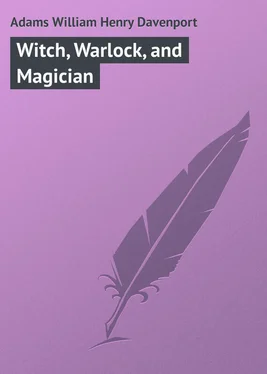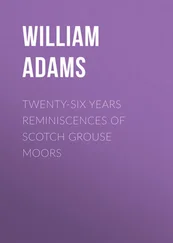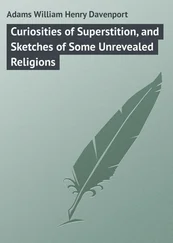William Adams - Witch, Warlock, and Magician
Здесь есть возможность читать онлайн «William Adams - Witch, Warlock, and Magician» — ознакомительный отрывок электронной книги совершенно бесплатно, а после прочтения отрывка купить полную версию. В некоторых случаях можно слушать аудио, скачать через торрент в формате fb2 и присутствует краткое содержание. Жанр: foreign_prose, foreign_language, на английском языке. Описание произведения, (предисловие) а так же отзывы посетителей доступны на портале библиотеки ЛибКат.
- Название:Witch, Warlock, and Magician
- Автор:
- Жанр:
- Год:неизвестен
- ISBN:нет данных
- Рейтинг книги:3 / 5. Голосов: 1
-
Избранное:Добавить в избранное
- Отзывы:
-
Ваша оценка:
- 60
- 1
- 2
- 3
- 4
- 5
Witch, Warlock, and Magician: краткое содержание, описание и аннотация
Предлагаем к чтению аннотацию, описание, краткое содержание или предисловие (зависит от того, что написал сам автор книги «Witch, Warlock, and Magician»). Если вы не нашли необходимую информацию о книге — напишите в комментариях, мы постараемся отыскать её.
Witch, Warlock, and Magician — читать онлайн ознакомительный отрывок
Ниже представлен текст книги, разбитый по страницам. Система сохранения места последней прочитанной страницы, позволяет с удобством читать онлайн бесплатно книгу «Witch, Warlock, and Magician», без необходимости каждый раз заново искать на чём Вы остановились. Поставьте закладку, и сможете в любой момент перейти на страницу, на которой закончили чтение.
Интервал:
Закладка:
Jean de Meung is also included among the alchemists; but he bequeathed to posterity in his glorious poem of the ‘Roman de la Rose’ something very much more precious than would have been any formula for making gold. In one sense he was indeed an alchemist, and possessed the secret of the universal medicine; for in his poem his genius has transmuted into purest gold the base ore of popular traditions and legends.
Some of the stories which Langlet du Fresnoy tells of Nicholas Flamel were probably invented long after his death, or else we should have to brand him as a most audacious knave. One of those amazing narratives pretends that he bought for a couple of florins an old and curious volume, the leaves of which – three times seven (this sounds better than twenty-one) in number – were made from the bark of trees. Each seventh leaf bore an allegorical picture – the first representing a serpent swallowing rods, the second a cross with a serpent crucified upon it, and the third a fountain in a desert, surrounded by creeping serpents. Who, think you, was the author of this mysterious volume? No less illustrious a person than Abraham the patriarch, Hebrew, prince, philosopher, priest, Levite, and magian, who, as it was written in Latin, must have miraculously acquired his foreknowledge of a tongue which, in his time, had no existence. A perusal of its mystic pages convinced Flamel that he had had the good fortune to discover a complete manual on the art of transmutation of metals, in which all the necessary vessels were indicated, and the processes described. But there was one serious difficulty to be overcome: the book assumed, as a matter of course, that the student was already in possession of that all-important agent of transmutation, the philosopher’s stone.
Careful study led Flamel to the conclusion that the secret of the stone was hidden in certain allegorical drawings on the fourth and fifth leaves; but, then, to decipher these was beyond his powers. He submitted them to all the learned savants and alchemical adepts he could get hold of: they proved to be no wiser than himself, while some of them actually laughed at Abraham’s posthumous publication as worthless gibberish. Flamel, however, clung fast to his conviction of the inestimable value of his ‘find,’ and daily pondered over the two cryptic illustrations, which may thus be described: On the first page of the fourth leaf Mercury was contending with a figure, which might be either Saturn or Time – probably the latter, as he carried on his head the emblematical hour-glass, and in his hand the not less emblematical scythe. On the second stage a flower upon a mountain-top presented the unusual combination of a blue stalk, with red and white blossoms, and leaves of pure gold. The wind appeared to blow it about very harshly, and a gruesome company of dragons and griffins encompassed it.
Upon the study of these provokingly obscure designs Flamel fruitlessly expended the leisure time of thrice seven years: after which, on the advice of his wife, he repaired to Spain to seek the assistance of some erudite Jewish rabbi. He had been wandering from place to place for a couple of years, when he met, somewhere in Leon, a learned Hebrew physician, named Canches, who agreed to return with him to Paris, and there examine Abraham’s volume. Canches was deeply versed in all the lore of the Cabala, and Flamel hung with delight on the words of wisdom that dropped from his eloquent lips. But at Orleans Canches was taken ill with a malady of which he died, and Flamel found his way home, a sadder, if not a wiser, man. He resumed his study of the book, but for two more years could get no clue to its meaning. In the third year, recalling some deliverance of his departed friend, the rabbi, he perceived that all his experiments had hitherto proceeded upon erroneous principles. He repeated them upon a different basis, and in a few months brought them to a successful issue. On January 13, 1382, he converted mercury into silver, and on April 25 into gold. Well might he cry in triumph, ‘Eureka!’ The great secret, the sublime magistery was his: he had discovered the art of transmuting metals into gold and silver, and, so long as he kept it to himself, had at his command the source of inexhaustible wealth.
At this time Nicholas Flamel, it is said, was about eighty years old. His admirers assert that he also discovered the elixir of immortal life; but, as he died in 1419, at the age (it is alleged) of 116, he must have been content with the merest sip of it! Why did he not reveal its ingredients for the general benefit of our afflicted humanity? His immense wealth he bequeathed to churches and hospitals, thus making a better use of it after death than he had made of it in his lifetime. For it is said that Flamel was a usurer, and that his philosopher’s stone was ‘cent per cent.’ It is true enough that he dabbled in alchemy, and probably he made his alchemical experiments useful in connection with his usurious transactions.
BOOK I
THE ENGLISH MAGICIANS
CHAPTER I
ROGER BACON: THE TRUE AND THE LEGENDARY
It was in the early years of the fourteenth century that the two pseudo-sciences of alchemy and astrology, the supposititious sisters of chemistry and astronomy, made their way into England. At first their progress was by no means so rapid as it had been on the Continent; for in England, as yet, there was no educated class prepared to give their leisure to the work of experimental investigation. A solitary scholar here and there lighted his torch at the altar-fire which the Continental philosophers kept burning with so much diligence and curiosity, and was generally rewarded for his heterodox enthusiasm by the persecution of the Church and the prejudice of the vulgar. But by degrees the new sciences increased the number of their adherents, and the more active intellects of the time embraced the theory of astral influences, and were fascinated by the delusion of the philosopher’s stone. Many a secret furnace blazed day and night with the charmed flames which were to resolve the metals into their original elements, and place the pale student in possession of the coveted magisterium , or ‘universal medicine.’ At length the alchemists became a sufficiently numerous and important body to draw the attention of the Government, which regarded their proceedings with suspicion, from a fear that the result might injuriously affect the coinage. In 1434 the Legislature enacted that the making of gold or silver should be treated as a felony. But the Parliament was influenced by a very different motive from that of the King and his Council, its patriotic fears being awakened lest the Executive, enabled by the new science to increase without limit the pecuniary resources of the Crown, should be rendered independent of Parliamentary control.
In the course of a few years, however, broader and more enlightened views prevailed; and it came to be acknowledged that scientific research ought to be relieved from legislative interference. In 1455 Henry VI. issued four patents in succession to certain knights, London citizens, chemists, monks, mass-priests, and others, granting them leave and license to undertake the discovery of the philosopher’s stone, ‘to the great benefit of the realm, and the enabling the King to pay all the debts of the Crown in real gold and silver .’ On the remarkable fact that these patents were issued to ecclesiastics as well as laymen, Prynne afterwards remarked, with true theological acridity, that they were so included because they were ‘such good artists in transubstantiating bread and wine in the Eucharist, and were, therefore, the more likely to be able to effect the transmutation of base metals into better.’ Nothing came of the patents. The practical common-sense of Englishmen never took very kindly to the alchemical delusion, and Chaucer very faithfully describes the contempt with which it was generally regarded. Enthusiasts there were, no doubt, who firmly believed in it, and knaves who made a profit out of it, and dupes who were preyed upon by the knaves; and so it languished on through the sixteenth and seventeenth centuries. It seems at one time to have amused the shrewd intellect of Queen Elizabeth, and at another to have caught the volatile fancy of the second Villiers, Duke of Buckingham. But alchemy was, in the main, the modus vivendi of quacks and cheats, of such impostors as Ben Jonson has drawn so powerfully in his great comedy – a Subtle, a Face, and a Doll Common, who, in the Sir Epicure Mammons of the time, found their appropriate victims. These creatures played on the greed and credulity of their dupes with successful audacity, and excited their imaginations by extravagant promises. Thus, Ben Jonson’s hero runs riot with glowing anticipations of what the alchemical magisterium can effect.
Читать дальшеИнтервал:
Закладка:
Похожие книги на «Witch, Warlock, and Magician»
Представляем Вашему вниманию похожие книги на «Witch, Warlock, and Magician» списком для выбора. Мы отобрали схожую по названию и смыслу литературу в надежде предоставить читателям больше вариантов отыскать новые, интересные, ещё непрочитанные произведения.
Обсуждение, отзывы о книге «Witch, Warlock, and Magician» и просто собственные мнения читателей. Оставьте ваши комментарии, напишите, что Вы думаете о произведении, его смысле или главных героях. Укажите что конкретно понравилось, а что нет, и почему Вы так считаете.











